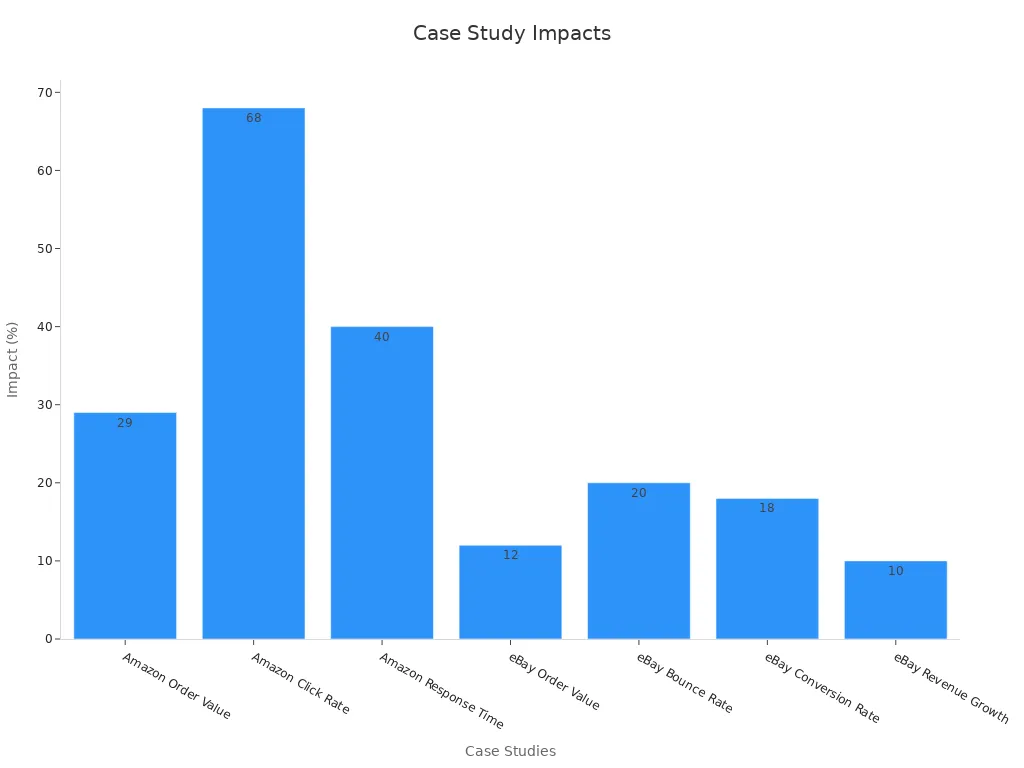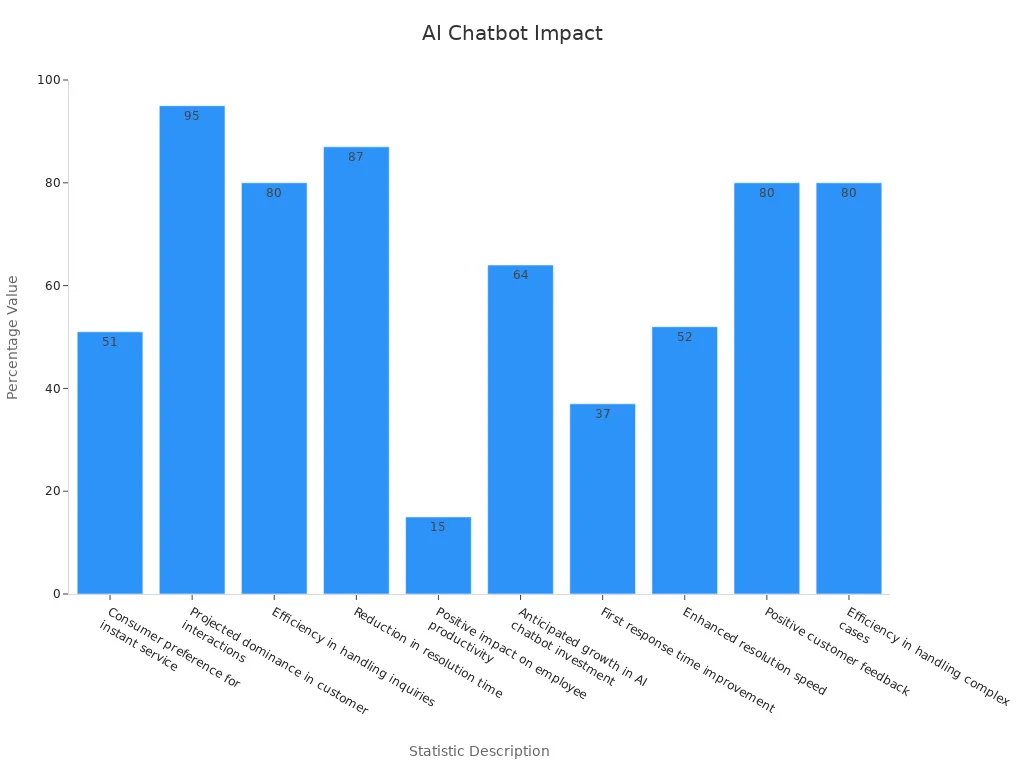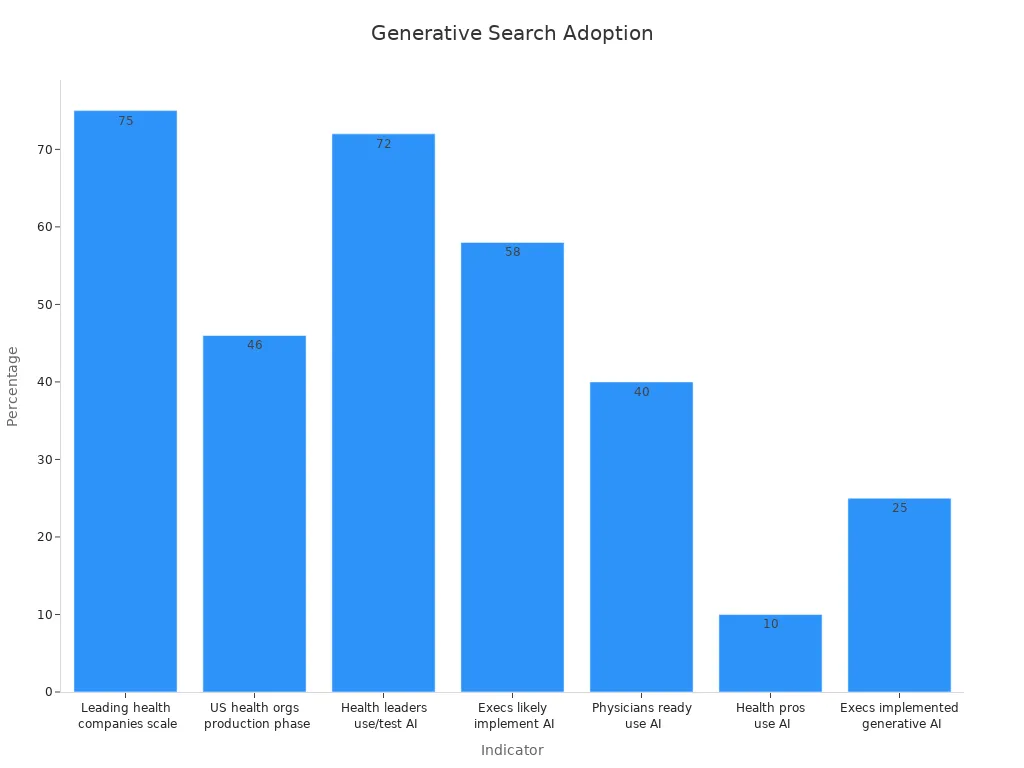5 Industries Winning Big with Generative Search
Discover how generative search is revolutionizing retail, healthcare, finance, media, and education by enhancing efficiency, personalization, and innovation.

Imagine search engines that don’t just give links but create answers for you. This is called generative search. It’s changing how businesses work with customers. For example, studies show 84% of Google searches now use AI. In some industries, like fashion, almost 99% of searches use this tech. These changes help businesses stand out, work faster, and give great experiences.
To keep up, companies use tools like Geneo. Geneo helps improve your content for AI-powered searches. This makes sure your website stays easy to find and competitive online.
Key Takeaways
Generative search makes shopping more personal, boosting sales and happiness.
AI tools in healthcare help doctors find problems and treat faster, saving lives.
In finance, generative search finds fraud and improves service, making banking safer.
Media and entertainment use AI to create content, letting creators focus on ideas while AI does boring tasks.
Education uses generative search to make learning personal, making lessons fun and easy for all students.
Retail

Personalized Shopping Experiences
Think about walking into a store where everything feels made for you. That’s what generative search does in retail. It looks at your likes, past searches, and actions to create a unique shopping experience. For example, Amazon uses AI to suggest items that match your style. This has led to a 29% rise in average order value and a 68% boost in click-through rates on suggested products.
But it’s not just about product suggestions. Generative search also improves email campaigns, increasing open rates by 18% and conversions by 22%. eBay, for instance, saw a 20% drop in bounce rates with better search results. These stats prove how generative search makes shopping easier and more enjoyable.

Inventory Management and Demand Forecasting
Managing stock is tricky. Too much means waste, and too little upsets buyers. Generative search helps stores find the right balance. By studying past data and market trends, AI predicts demand accurately. Stores report up to 30% fewer forecast mistakes and 20% less extra inventory.
One big retailer cut inventory costs by 15% using AI demand forecasts. Generative search also updates inventory tracking automatically, so no manual work is needed. This saves money and ensures customers get what they want when they need it.
Enhancing Customer Support with AI Chatbots
Nobody enjoys waiting on hold. With AI chatbots powered by generative search, you don’t have to. These bots handle up to 80% of simple tasks, giving quick answers to common questions. For example, Lyft cut its response times by 87% using AI for customer care.
AI chatbots also save money. An Australian health insurer, NIB, saved $22 million by automating support. Plus, these bots make customers happy. About 80% of users say they have good experiences with AI chatbots. As generative search improves, support will become even faster and more personal.

Generative search is changing retail. From custom shopping to better stock management and fast support, it’s shaping the future of how we shop.
Healthcare
Advancements in Diagnostics and Predictive Analytics
Imagine doctors spotting illnesses before they even start. Generative search is making this possible. AI studies huge amounts of data to find patterns people might miss. For example, IBM’s Watson reviews 600,000 medical studies and 1.5 million patient records. It diagnoses lung cancer with a 90% success rate, compared to 50% for human doctors. This helps catch diseases early and treat them better.
AI also predicts health problems before they happen. Tools like XGBoost can guess heart disease with 98.5% accuracy. This lets doctors act sooner, saving lives and cutting costs.
Here’s how AI is improving diagnostics:
Study | Condition | Model/Method | Accuracy | Extra Metrics |
|---|---|---|---|---|
Zakareya et al. | Breast Cancer | Deep Learning Model | 93% (Ultrasound), 95% (Histopathology) | - |
Ogunpola et al. | Cardiovascular Disease | XGBoost Model | 98.50% | Precision: 99.14%, Recall: 98.29%, F1 Score: 98.71% |
These tools help healthcare providers make quicker and smarter decisions.

Improving Patient Care and Treatment Plans
Generative search doesn’t stop at finding illnesses. It’s also changing how doctors plan treatments. AI looks at your health data to suggest care made just for you. For example, it can spot risks for diabetes or heart disease early. This means you get help before problems grow.
Real-time health trackers are another big win. These devices watch your vitals and alert doctors if something’s wrong. Imagine wearing a gadget that keeps you safe by warning your doctor. That’s how AI makes healthcare smarter.
Here’s how AI improves patient care:
AI reads medical images carefully, reducing mistakes in diagnoses.
Predictive tools find risks early, helping doctors act faster.
AI systems suggest treatments based on your personal health data.
Health trackers help doctors adjust care quickly when needed.
With these tools, you can trust your doctor to stay ahead of your needs.
Streamlining Administrative Processes
Healthcare paperwork can be a hassle. Generative search helps hospitals and clinics handle it better. AI automates tasks like billing and forms, saving time and reducing errors. This lets doctors and nurses focus more on patients.
For example, AI makes scheduling easier, so you can see your doctor faster. It also speeds up documentation, saving healthcare workers up to 134 hours a year. That’s time they can use to care for patients.
Here’s how AI simplifies operations:
Metric Description | Reduction (%) | Time Saved (hours/year) |
|---|---|---|
21–30% | 95–134 | |
Time saved on patient admissions, transfers, | 37–46% | 32–40 |
and discharges |
AI also helps remind patients about appointments and follow-ups. This makes healthcare smoother and more efficient.
Tip: With generative search, hospitals can spend less time on paperwork and more time helping patients.
Finance
Fraud Detection and Risk Management
Fraud costs businesses about $3.7 trillion every year. But AI tools are helping to fight back. With generative search, banks can spot strange transaction patterns quickly. This helps stop fraud before it happens. Did you know 75% of financial institutions already use or plan to use AI? That’s because it works well.
AI doesn’t just stop fraud. It also helps predict risks. By studying market trends and customer actions, it finds possible problems early. This keeps your money safer and gives you peace of mind.
Enhancing Customer Service with AI-Powered Assistants
Waiting on hold to talk to a bank is frustrating. AI assistants make this easier. Tools like Bank of America’s Erica chatbot help you check balances or get advice fast. These bots save time and give accurate answers, making customers happier.
Generative AI goes even further. It creates replies based on your needs. For example, Morgan Stanley uses AI to help advisors find answers faster. This means better service for you and less waiting time.
Personalized Financial Planning and Insights
Imagine having a financial advisor who knows you really well. Generative search makes this happen by studying your spending, income, and goals. It uses this data to create a plan just for you. Large language models (LLMs) even adjust their tone to sound more human, making advice easier to understand.
AI also helps predict future trends. By looking at past data and market changes, it gives smart insights. Whether saving for college or retirement, these tools help you stay on track.
Tip: Generative search isn’t just about numbers—it makes managing money easier and more personal.
Media and Entertainment

AI-Driven Content Creation and Curation
Think of an assistant that never runs out of ideas. Generative search is changing how media content is made. Tools like ChatGPT and DALL·E help creators work faster. Writers, artists, and musicians use these tools to create new things. They can make scripts, visuals, or music quickly and easily.
Here’s how AI helps with content creation:
It makes writing stories and scripts faster.
It helps artists design amazing visuals with little effort.
It supports musicians in creating unique songs and lyrics.
With generative search, you can focus on being creative while AI does the hard work.
Audience Engagement and Recommendation Systems
Ever wonder how Netflix knows what you like? Generative search powers systems that suggest shows just for you. These tools study what you watch and recommend things you’ll enjoy.
Here’s how companies improve engagement:
Company | How Engagement Improved |
|---|---|
Netflix | More users and higher revenue from personalized suggestions. |
Amazon | |
Spotify | More users and better engagement with tailored playlists. |
Personalized suggestions don’t just entertain—they make customers 20% happier. Generative AI makes these tools smarter, so you always find something fun.
Streamlining Production Processes
Making movies, shows, or music takes a lot of work. Generative search makes it easier and faster. AI tools handle tasks like editing, planning, and casting. This saves time and lets teams focus on making great content.
For example, AI can suggest script changes or plan filming based on weather. It can even guess how audiences will react to scenes. This helps creators improve their work before it’s released. Generative search makes production quicker, smarter, and more efficient.
Education
Personalized Learning Experiences
Imagine lessons made just for you. Generative search makes this possible. AI studies your learning style, speed, and interests. It creates lessons that match how you learn best. For example, visual learners get pictures, while hands-on learners get activities. This keeps you interested and helps you learn faster.
Research proves this works. A study by J. Lu et al. (2024) showed teachers using AI tools felt more confident. Another study by Ramos & Condotta (2024) found personalized lessons improved focus and memory. These tools don’t just teach—they motivate.
Tip: Generative search doesn’t replace teachers. It helps them focus on helping students succeed.
Automating Administrative Tasks
Teachers spend too much time on paperwork. Generative search fixes this problem. AI now handles tasks like grading, schedules, and attendance. This saves hours every week, letting teachers focus on teaching.
For example, AI grades essays by checking grammar and ideas. It also gives feedback to help students improve. Schools using AI report faster grading and fewer mistakes. Imagine getting test results in minutes instead of days!
Here’s how automation helps:
Speeds up grading and feedback.
Makes scheduling easier.
Reduces errors in paperwork.
With generative search, schools work better, and teachers have more time for students.
Enhancing Accessibility and Inclusivity in Education
Learning should be for everyone. Generative search helps make this happen. AI tools help students with disabilities, language barriers, or anxiety. Features like speech-to-text and image descriptions make lessons easier for all.
For example, the "M-Powering Teachers" tool gives fair feedback, helping students join in more. AI also adjusts lessons for unique needs, keeping students engaged. Whether it’s dyslexia or learning English, these tools create a welcoming classroom.
Did you know? Generative search helps teachers improve their methods, so every student gets the support they need.
Education is changing, and generative search is leading the way. From custom lessons to inclusive classrooms, it’s building a future where everyone can succeed.
Generative search is changing industries by making work faster and smarter. It helps stores guess what customers need, lets doctors find illnesses quickly, and creates lessons that fit how students learn best.
Evidence Type | What It Does |
|---|---|
Efficiency | GenAI gathers info fast to help decisions happen quicker. |
Comprehensiveness | It mixes ideas to give clear and complete answers. |
Complementary Strengths | Using GenAI with old methods makes choices even better. |
The future is exciting. The generative AI market might grow from $86.9 billion in 2022 to $407 billion by 2027, growing 46% each year. By 2030, it could add $19.9 trillion to the world’s economy.
To keep up, businesses need tools like Geneo. Geneo makes your content easy for generative search engines to find, keeping your brand strong online. As this tech grows, it will keep changing industries and opening new doors for success.
FAQ
What is generative search, and how does it work?
Generative search uses AI to give answers, not just links. It studies your question, gathers data, and creates custom replies. It’s like having a smart helper that knows what you need.
How can Geneo help my business?
Geneo makes your website better for AI searches like ChatGPT. It boosts your content’s visibility, tracks results, and gives useful tips. With Geneo, your business stays ahead online.
Which industries benefit the most from generative search?
Retail, healthcare, finance, media, and education use it the most. Generative search improves customer service, speeds up work, and sparks new ideas. It’s changing how businesses connect with people.
Is generative search expensive to implement?
Not always! Tools like Geneo have budget-friendly plans for all sizes. You can try it for free to see how it helps. It’s a smart choice for growing your business.
Will generative search replace traditional search engines?
No, it works with traditional search engines, not against them. It gives detailed, personal answers for harder questions. Both types make searching online better.
See Also
The Importance of Generative Engine Optimization for B2B SaaS
Steps to Effectively Implement Generative Engine Optimization
Mastering AI Search Optimization Techniques for 2025
Understanding Generative Engine Optimization: What Is GEO?
Proven Strategies to Achieve High Rankings in ChatGPT Search
